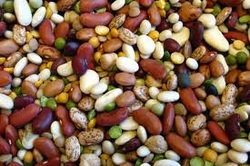
To most Americans, eating healhtier means choosing low-fat and low -cholesterol items. Of course, the food industries respond by providing foods low in these two components. But when fat content is lowered in your diet, protein content is usually increased, especially animal protein. Now, the meat and dairy industries bombard us with brilliant marketing campaigns touting how wonderful meat and dairy is, making protein the "all American" nutrient. Research demonstrates otherwise. The medical truth is simple: Excess proteins, especially from animal products, place a serious burden on your health and promote diseases.
 RSS Feed
RSS Feed
